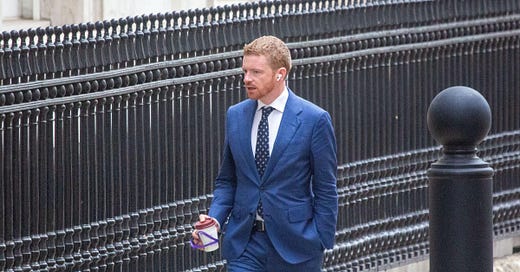Starmer needs a top civil servant who can stand up to Morgan McSweeney
What the Prime Minister's new team will require to succeed.
It does not matter now, except to her, whether Sue Gray was more sinned against than sinning. She has gone by mutual consent. Sir Keir Starmer has reset his government by starting what upmarket commentators like to call a “total overhaul” of the team working most closely with him.
The Prime Minister has binned his star outside hiring and promoted those who were already serving him loyally back when she was a Conservative government enforcer. Having two rival right hands in Downing Street – Head of Strategy, Morgan McSweeney, and Chief of Staff, Sue Gray, never looked like a clever idea.
McSweeney has replaced Gray as Chief of Staff. He had the same title before in opposition. He and cabinet minister, Pat McFadden, have been Starmer’s political brains for years. The two newly created “Deputy Chiefs of Staff” - Vidhya Alakeson and Jill Cuthbertson - are veterans from the leader of the opposition’s Praetorian guard. Ninjeri Pandit has moved back into the civil service as principal private secretary from being director of the policy unit, a post traditionally held by the likes of David Miliband, wannabe politicians on the way up.
The nation may sigh at the Ruritanian title inflation – job descriptions are always fought over bitterly when a new government takes over. Of greater concern is whether the new team will result in a better government with a clear sense of purpose and fewer blunders.
Labour is not entirely to blame for its horrible honeymoon. The wedding venue and the dance band had not been booked. Rishi Sunak caught nearly everyone on the hop with his 4 July General Election. Preparations for government were not in place. Gray thought she had months to go before an October poll. McSweeney tried to put the party on a war footing from the beginning of the year. Even so, Starmer never had the chance to prepare properly for his TV debates because “debate camp” was booked to take place in mid-August, inevitably at Lord Alli’s Sussex estate.
Since Labour’s victory, Starmer has been trying to drive the vehicle of state while he and his advisors are still reading the manual. Gray, a non-politician and notoriously last-minute as a civil servant, is blamed for not having a grid of political actions in place. She should not have demanded control of it.
Senior politicians in the government have also been found wanting. Starmer is known to take his time, putting off confrontations and arguments until he is forced to act decisively, as he has now done belatedly.
Those ministers who were best prepared by red lights already flashing on the dashboard dealt with them with big pay rises for health and transport strikers. But Rachel Reeves was not ready to deliver her budget, even though it had been long trailed as the cornerstone of the new government. So early economic moves, such as the winter fuel payments cut and the public sector pay awards, jangled without being placed in the context of a coherent “mission”.
The Chancellor was still not ready when MPs returned to Westminster in September after the summer recess. By then, the electorate was weary of Labour’s "blame the Tories" routine. The inevitable scrutiny of party conference season fell at random on gossip about Labour freebies and infighting and Conservative gloating at the discomfort of their recent vanquishers.
Starmer did not seem to know what support he would need as prime minister – a job in which many of his predecessors have warned: “it comes at you from all directions”. Nobody seems to have been there to tell him either. Or perhaps he did not listen to them. As he likes to remind us, Sir Keir has been head of a government department before, as Director of Public Prosecutions. He has never underestimated his own solo abilities.
The prime minister’s newly promoted team are still learning about being in government. James Lyons, the newly created Head of Strategic communications has experience of government in the round as a journalist for the Sunday Times and PR man for NHS England and TikTok – though not from inside Whitehall.
The senior civil service appointments that the prime minister has still to make are crucial. Rishi Sunak included a trashed mandarinate in the ticking timebomb he passed hastily to Keir Starmer. Due to the previous government’s politicking, the new prime minister took office with no reliable Cabinet Secretary, principal private secretary, National Security Advisor or ambassador to Washington. A Labour manifesto commitment to instal a fully independent Ethics Advisor to enforce the ministerial code remains under review.
An effective government needs to rely on a close and constructive working relationship with its civil servants if it is to deliver policies successfully. The absence of such a partnership is a major reason why recent Conservative governments failed. Leading Tories never tired of railing against “the blob” and looking to cut it. That confrontational attitude towards civil servants was still evident at the recent Conservative party conference. “There’s about 5-10 per cent of them who are very, very bad. You know, should-be-in-prison bad”, leadership contender Kemi Badenoch told delegates.
Badenoch conceded that there are about the same proportion who are “absolutely magnificent” and ministers “need to find them”. That may be easier for this government which is loudly committed to “service” and the public sector.
Starmer should avoid appointing friends or cronies to the remaining top jobs. In the national interest, he also needs to draw on the advice of independent civil servants, who are committed to good governance rather than any political party. In recent history, civil servants such as Jeremy Heywood, Christopher Meyer, and Gus O’Donnell have been of vital and intimate importance to governments of both colours. That is how the system is supposed to work.
A headline in Monday’s Daily Mail - The Ten Downing Street “boys’ club” sees off Sue - typifies the perception that McSweeney and his mostly male allies have won a turf war. Starmer has tried to counter that charge by the promotion of Pandit, Alakeson and Cuthbertson. But these three women, like Rachel Reeves and Angela Rayner, have more political than administrative experience in government. The prime minister could now appoint the first ever female Cabinet Secretary from a well-qualified field of applicants.
Whoever gets that job will need to have the character and authority to stand up to McSweeney, in case he gets over mighty. I am told that when the Labour elite gather he, rather than Starmer, is hailed as the true architect of the Labour victory and that McSweeney rather enjoys the attention. For all their brilliance, unelected aides who get dubbed “the real prime minister” such as Alastair Campbell, Dominic Cummings and perhaps even Sue Gray usually crash and burn in the end, doing much collateral damage to the cause they championed.
The delay of the Budget until 30 October now works in Labour’s favour. It could be the centrepiece of the government’s reset after its chaotic first hundred days. Reeves may unveil a credible and inclusive plan to make this nation better. That would still only be a restart. The prime minister will require years of stability and competence in Number 10 to implement it.
That will demand that he has a much broader team around him. His personal staff must embrace people with expertise in economics, foreign affairs and administration and, above all, the willingness to respect each other.






